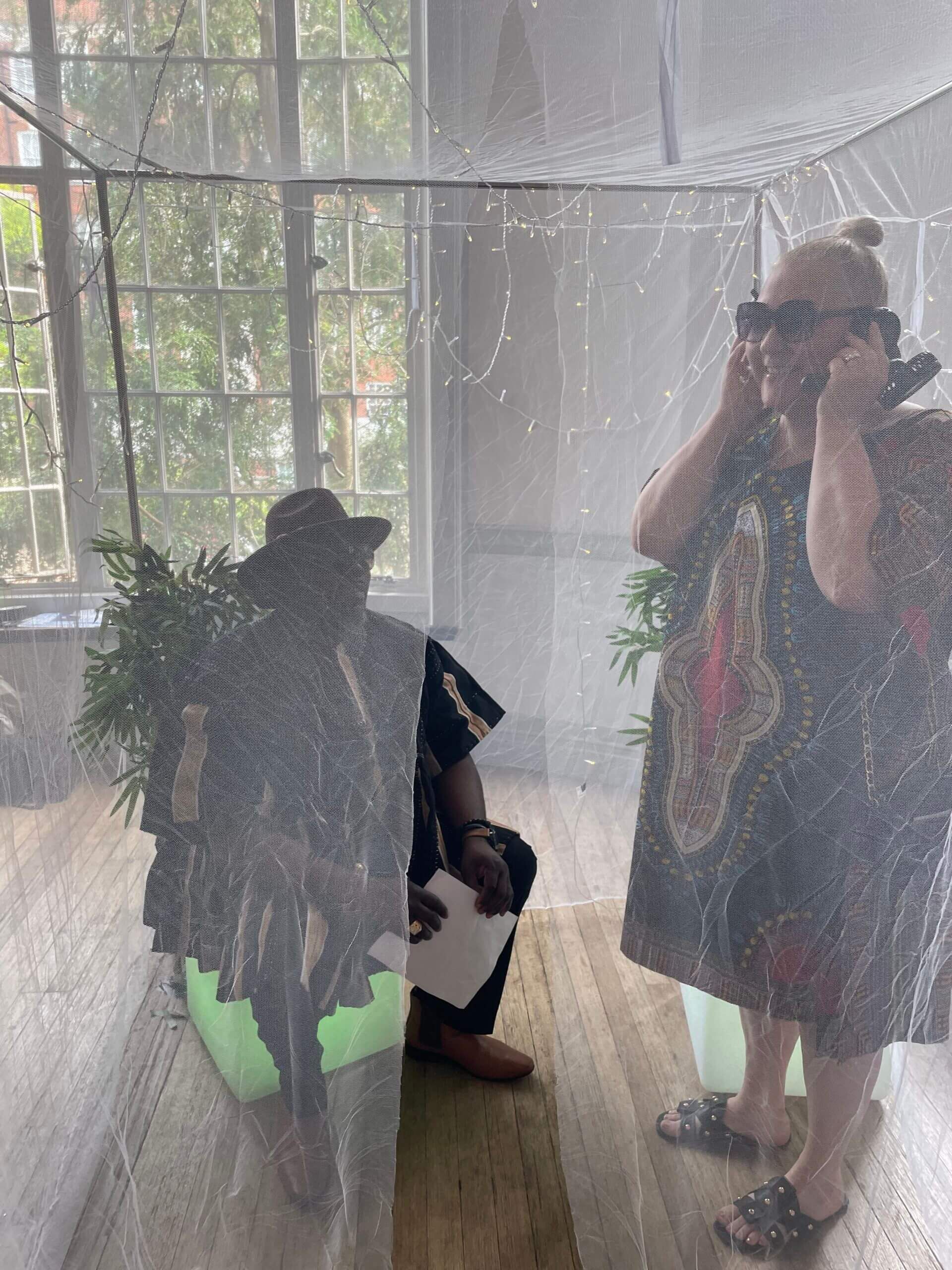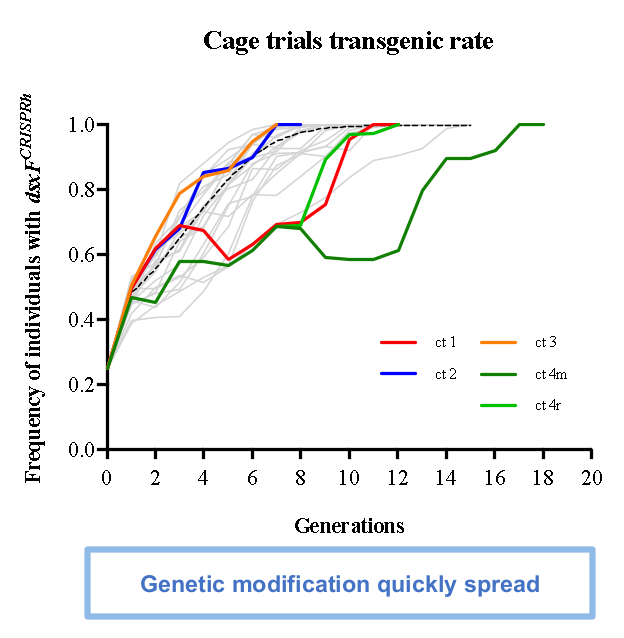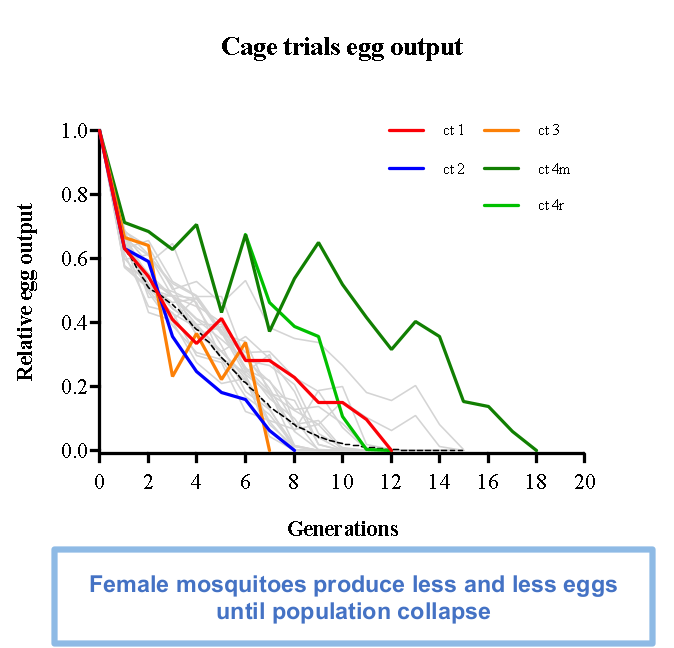Sonic Ecology

'Swarm' – a sonification of the 2016 cage trials by Imperial College London
Production: Sonic Ecology
Client: Target Malaria
Client: Target Malaria
Using data from a landmark 2018 paper by Imperial College London, Sonic Ecology developed “Swarm”, a two-minute-long composition, sonifying the cage trials of gene drive mosquitoes. The cage trials test the modification of a gene important for female fertility to reduce the population of malaria mosquitoes using the gene drive technology. As demonstrated in computer models, the cage trials confirmed a rapid spread of the genetic modification, as well as an eventual targeted reduction of malaria mosquito population.
It remains a privilege to live and travel in areas where experiences with mosquitos tend to be relatively benign; being bitten all over on a jaunt to the countryside, a silent negotiation with a still form on the ceiling, a shock out of sleep by high pitched whining next to our ears. However, in malaria-stricken areas, an experience with mosquitoes brings the threat of death, the knowledge that it is responsible for loved ones already lost, a battle with thousands of attackers in an unshielded home.
The intention was to sonically convey the sense of threat from a swarm of malaria-carrying mosquitoes (informed by the real experience of people in places like Burkina Faso where Target Malaria works), which diminishes over time as the population reduces. The progression of the piece leads the swarm to a state of silence, as harmonies represent a rising gene modification rate. The combined effect demonstrates the scope of the technology and hopefully expresses a sense of relief from harm.
Burkina Faso is one of the most highly malaria-infected places in the world. The disease is responsible for almost half of health provider consultations and one in five deaths. The world’s estimated number of malaria deaths stood at 627,000 in 2020, with 80% of all deaths in the Africa Region being children under five. The hope is that the sonification will shed light on threats to people in malaria-stricken areas, and to raise awareness on gene drive technology, which if ethically managed, could be crucial for the worldwide fight against malaria.
“Swarm” uses the 2016 Cr-Z4050E5 Cage Trials, published in a 2018 landmark paper in Nature by Imperial College London: A CRISPR–Cas9 gene drive targeting doublesex causes complete population suppression in caged Anopheles gambiae mosquitoes. Target Malaria’s science teams also provided additional data on two more cages that were not included in the publication.
It remains a privilege to live and travel in areas where experiences with mosquitos tend to be relatively benign; being bitten all over on a jaunt to the countryside, a silent negotiation with a still form on the ceiling, a shock out of sleep by high pitched whining next to our ears. However, in malaria-stricken areas, an experience with mosquitoes brings the threat of death, the knowledge that it is responsible for loved ones already lost, a battle with thousands of attackers in an unshielded home.
The intention was to sonically convey the sense of threat from a swarm of malaria-carrying mosquitoes (informed by the real experience of people in places like Burkina Faso where Target Malaria works), which diminishes over time as the population reduces. The progression of the piece leads the swarm to a state of silence, as harmonies represent a rising gene modification rate. The combined effect demonstrates the scope of the technology and hopefully expresses a sense of relief from harm.
Burkina Faso is one of the most highly malaria-infected places in the world. The disease is responsible for almost half of health provider consultations and one in five deaths. The world’s estimated number of malaria deaths stood at 627,000 in 2020, with 80% of all deaths in the Africa Region being children under five. The hope is that the sonification will shed light on threats to people in malaria-stricken areas, and to raise awareness on gene drive technology, which if ethically managed, could be crucial for the worldwide fight against malaria.
“Swarm” uses the 2016 Cr-Z4050E5 Cage Trials, published in a 2018 landmark paper in Nature by Imperial College London: A CRISPR–Cas9 gene drive targeting doublesex causes complete population suppression in caged Anopheles gambiae mosquitoes. Target Malaria’s science teams also provided additional data on two more cages that were not included in the publication.
Project management by Sonic Ecology with Target Malaria
Composed and produced by Jamie Perera



